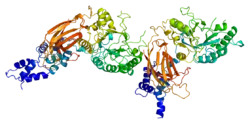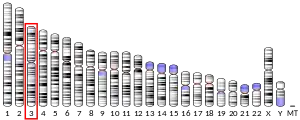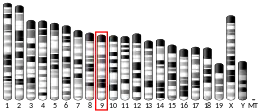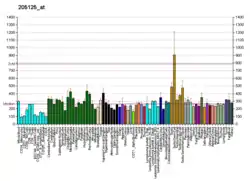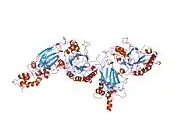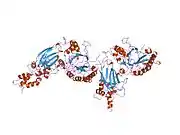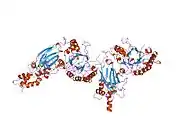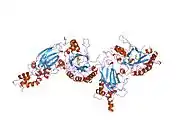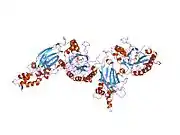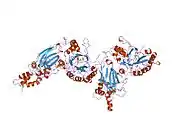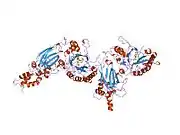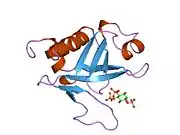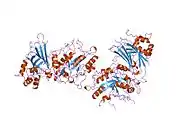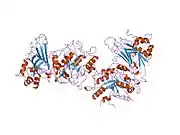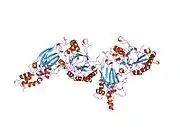PLCD1
1-Phosphatidylinositol-4,5-bisphosphate phosphodiesterase delta-1 is an enzyme that in humans is encoded by the PLCD1 gene.[5][6] PLCd1 is essential to maintain homeostasis of the skin.
See also
References
- GRCh38: Ensembl release 89: ENSG00000187091 - Ensembl, May 2017
- GRCm38: Ensembl release 89: ENSMUSG00000010660 - Ensembl, May 2017
- "Human PubMed Reference:". National Center for Biotechnology Information, U.S. National Library of Medicine.
- "Mouse PubMed Reference:". National Center for Biotechnology Information, U.S. National Library of Medicine.
- Ishikawa S, Takahashi T, Ogawa M, Nakamura Y (Nov 1997). "Genomic structure of the human PLCD1 (phospholipase C delta 1) locus on 3p22→p21.3". Cytogenet Cell Genet. 78 (1): 58–60. doi:10.1159/000134629. PMID 9345909.
- "Entrez Gene: PLCD1 phospholipase C, delta 1".
Further reading
- Yagisawa H (2006). "Nucleocytoplasmic shuttling of phospholipase C-delta1: a link to Ca2+". J. Cell. Biochem. 97 (2): 233–43. doi:10.1002/jcb.20677. PMID 16240320. S2CID 84240929.
- Cefai D, Debre P, Kaczorek M, et al. (1991). "Human immunodeficiency virus-1 glycoproteins gp120 and gp160 specifically inhibit the CD3/T cell-antigen receptor phosphoinositide transduction pathway". J. Clin. Invest. 86 (6): 2117–24. doi:10.1172/JCI114950. PMC 329852. PMID 1979339.
- Zauli G, Previati M, Caramelli E, et al. (1995). "Exogenous human immunodeficiency virus type-1 Tat protein selectively stimulates a phosphatidylinositol-specific phospholipase C nuclear pathway in the Jurkat T cell line". Eur. J. Immunol. 25 (9): 2695–700. doi:10.1002/eji.1830250944. PMID 7589147.
- Cheng HF, Jiang MJ, Chen CL, et al. (1995). "Cloning and identification of amino acid residues of human phospholipase C delta 1 essential for catalysis". J. Biol. Chem. 270 (10): 5495–505. doi:10.1074/jbc.270.10.5495. PMID 7890667.
- Ghosh S, Pawelczyk T, Lowenstein JM (1997). "Phospholipase C isoforms delta 1 and delta 3 from human fibroblasts. High-yield expression in Escherichia coli, simple purification, and properties". Protein Expr. Purif. 9 (2): 262–78. doi:10.1006/prep.1996.0682. PMID 9056492.
- Chen P, Mayne M, Power C, Nath A (1997). "The Tat protein of HIV-1 induces tumor necrosis factor-alpha production. Implications for HIV-1-associated neurological diseases". J. Biol. Chem. 272 (36): 22385–8. doi:10.1074/jbc.272.36.22385. PMID 9278385.
- Park ES, Won JH, Han KJ, et al. (1998). "Phospholipase C-delta1 and oxytocin receptor signalling: evidence of its role as an effector". Biochem. J. 331 (1): 283–9. doi:10.1042/bj3310283. PMC 1219350. PMID 9512491.
- Shimohama S, Kamiya S, Fujii M, et al. (1998). "Mutation in the pleckstrin homology domain of the human phospholipase C-delta 1 gene is associated with loss of function". Biochem. Biophys. Res. Commun. 245 (3): 722–8. doi:10.1006/bbrc.1998.8307. PMID 9588182.
- Mayne M, Bratanich AC, Chen P, et al. (1998). "HIV-1 tat molecular diversity and induction of TNF-alpha: implications for HIV-induced neurological disease". Neuroimmunomodulation. 5 (3–4): 184–92. doi:10.1159/000026336. PMID 9730685. S2CID 19529677.
- Haughey NJ, Holden CP, Nath A, Geiger JD (1999). "Involvement of inositol 1,4,5-trisphosphate-regulated stores of intracellular calcium in calcium dysregulation and neuron cell death caused by HIV-1 protein tat". J. Neurochem. 73 (4): 1363–74. doi:10.1046/j.1471-4159.1999.0731363.x. PMID 10501179. S2CID 25410140.
- Mayne M, Holden CP, Nath A, Geiger JD (2000). "Release of calcium from inositol 1,4,5-trisphosphate receptor-regulated stores by HIV-1 Tat regulates TNF-alpha production in human macrophages". J. Immunol. 164 (12): 6538–42. doi:10.4049/jimmunol.164.12.6538. PMID 10843712.
- Nash MS, Young KW, Willars GB, et al. (2001). "Single-cell imaging of graded Ins(1,4,5)P3 production following G-protein-coupled-receptor activation". Biochem. J. 356 (Pt 1): 137–42. doi:10.1042/0264-6021:3560137. PMC 1221821. PMID 11336645.
- Ananthanarayanan B, Das S, Rhee SG, et al. (2002). "Membrane targeting of C2 domains of phospholipase C-delta isoforms". J. Biol. Chem. 277 (5): 3568–75. doi:10.1074/jbc.M109705200. PMID 11706040.
- Keshamouni VG, Mattingly RR, Reddy KB (2002). "Mechanism of 17-beta-estradiol-induced Erk1/2 activation in breast cancer cells. A role for HER2 AND PKC-delta". J. Biol. Chem. 277 (25): 22558–65. doi:10.1074/jbc.M202351200. PMID 11960991.
- Strausberg RL, Feingold EA, Grouse LH, et al. (2003). "Generation and initial analysis of more than 15,000 full-length human and mouse cDNA sequences". Proc. Natl. Acad. Sci. U.S.A. 99 (26): 16899–903. doi:10.1073/pnas.242603899. PMC 139241. PMID 12477932.
- Bennasser Y, Badou A, Tkaczuk J, Bahraoui E (2003). "Signaling pathways triggered by HIV-1 Tat in human monocytes to induce TNF-alpha". Virology. 303 (1): 174–80. doi:10.1006/viro.2002.1676. PMID 12482669.
- Guo Y, Philip F, Scarlata S (2003). "The Pleckstrin homology domains of phospholipases C-beta and -delta confer activation through a common site". J. Biol. Chem. 278 (32): 29995–30004. doi:10.1074/jbc.M301438200. PMID 12761218.
- Caprini M, Gomis A, Cabedo H, et al. (2003). "GAP43 stimulates inositol trisphosphate-mediated calcium release in response to hypotonicity". EMBO J. 22 (12): 3004–14. doi:10.1093/emboj/cdg294. PMC 162146. PMID 12805215.
- Kim JY, Kim H, Lee SG, et al. (2003). "Amyloid beta peptide (Abeta42) activates PLC-delta1 promoter through the NF-kappaB binding site". Biochem. Biophys. Res. Commun. 310 (3): 904–9. doi:10.1016/j.bbrc.2003.09.100. PMID 14550290.
This article is issued from Wikipedia. The text is licensed under Creative Commons - Attribution - Sharealike. Additional terms may apply for the media files.
